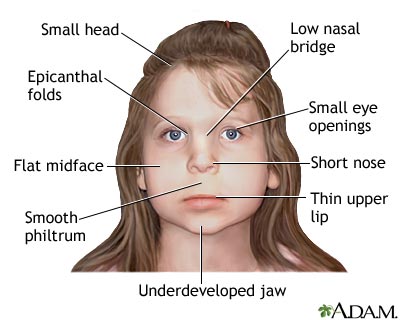 Our prenatal environment (the environment of the womb) has an outsized effect on our development. For example, drinking even modest amounts of alcohol during pregnancy can cause fetal alcohol syndrome, which includes mental retardation, stunted growth, and disfigurement of facial features (see diagram at right).
Our prenatal environment (the environment of the womb) has an outsized effect on our development. For example, drinking even modest amounts of alcohol during pregnancy can cause fetal alcohol syndrome, which includes mental retardation, stunted growth, and disfigurement of facial features (see diagram at right).The environment of an obese woman's womb (especially one with diabetes) tends to be injurious to a fetus's metabolism. For example, a fetus will react to high placental blood sugar levels by stimulating insulin production in the pancreas or by becoming resistant to insulin. These steps apparently predispose the baby to become diabetic later in life. Among other things, being born to a obese mother makes a baby more likely to get diabetes, to have asthma, and to become obese later in life. It's not just children, either, who are affected. A convincing study in the New England Journal of Medicine suggests that when someone becomes obese during a certain interval, it makes their friends significantly more likely to become obese as well.
Preventing a patient's obesity can mean preventing their children's, grandchildren's, and friends' obesity as well. All the more incentive to act now to reverse the worldwide obesity epidemic.
[Image is in the public domain, via the NIH's A.D.A.M. medical encyclopedia]